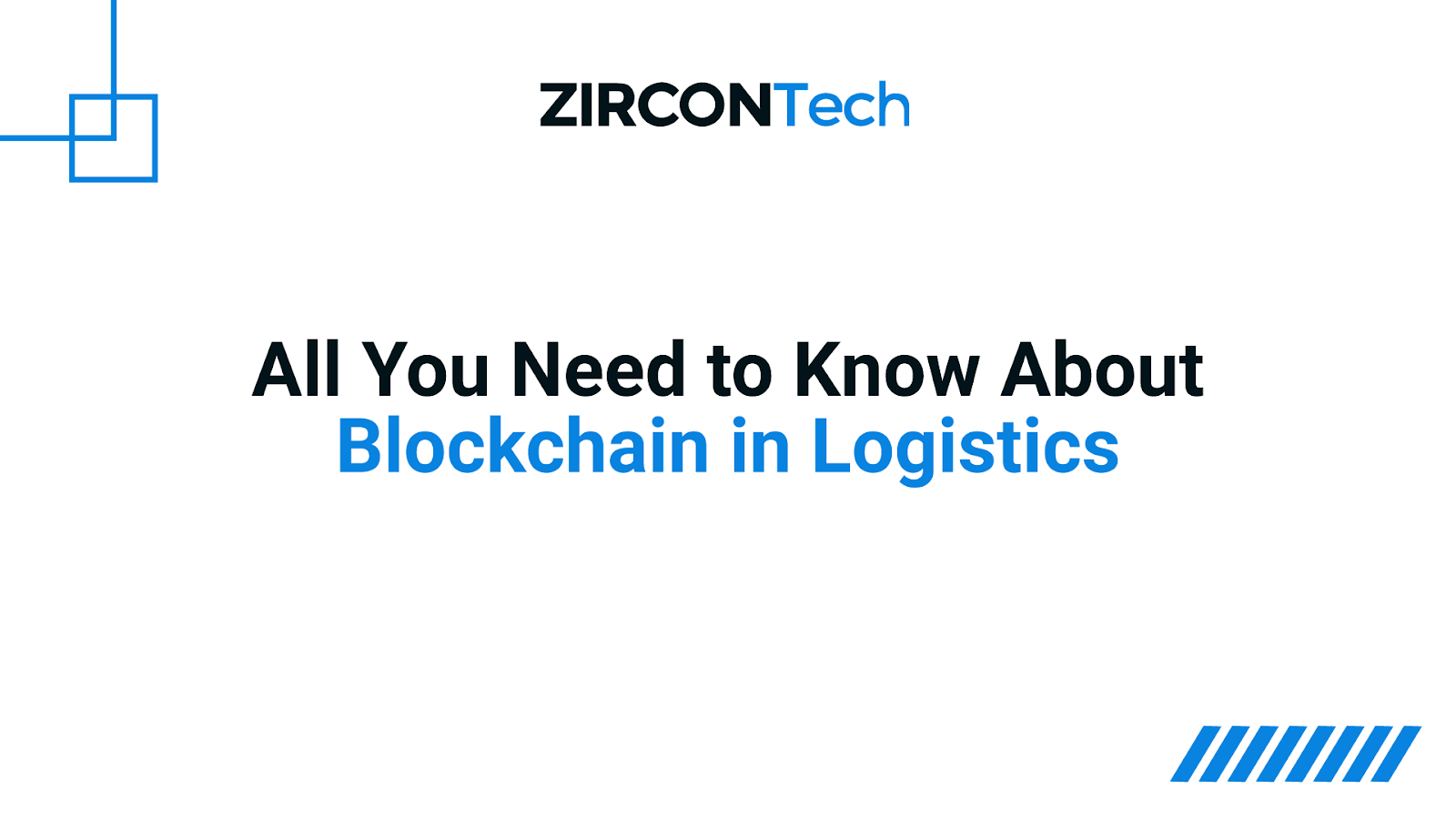
How Are Blockchain and Logistics Related? Supply Chain, Shipping and More
People and organizations across the world are becoming increasingly comfortable with the concept of the blockchain. The application of blockchain technology – particularly in the context of cryptocurrency – is widely accepted as a method of enabling smooth commercial transactions to take place.
But there is one particular area in which blockchain technology can deliver significant benefits to all parties in a business relationship, and that is blockchain in logistics.
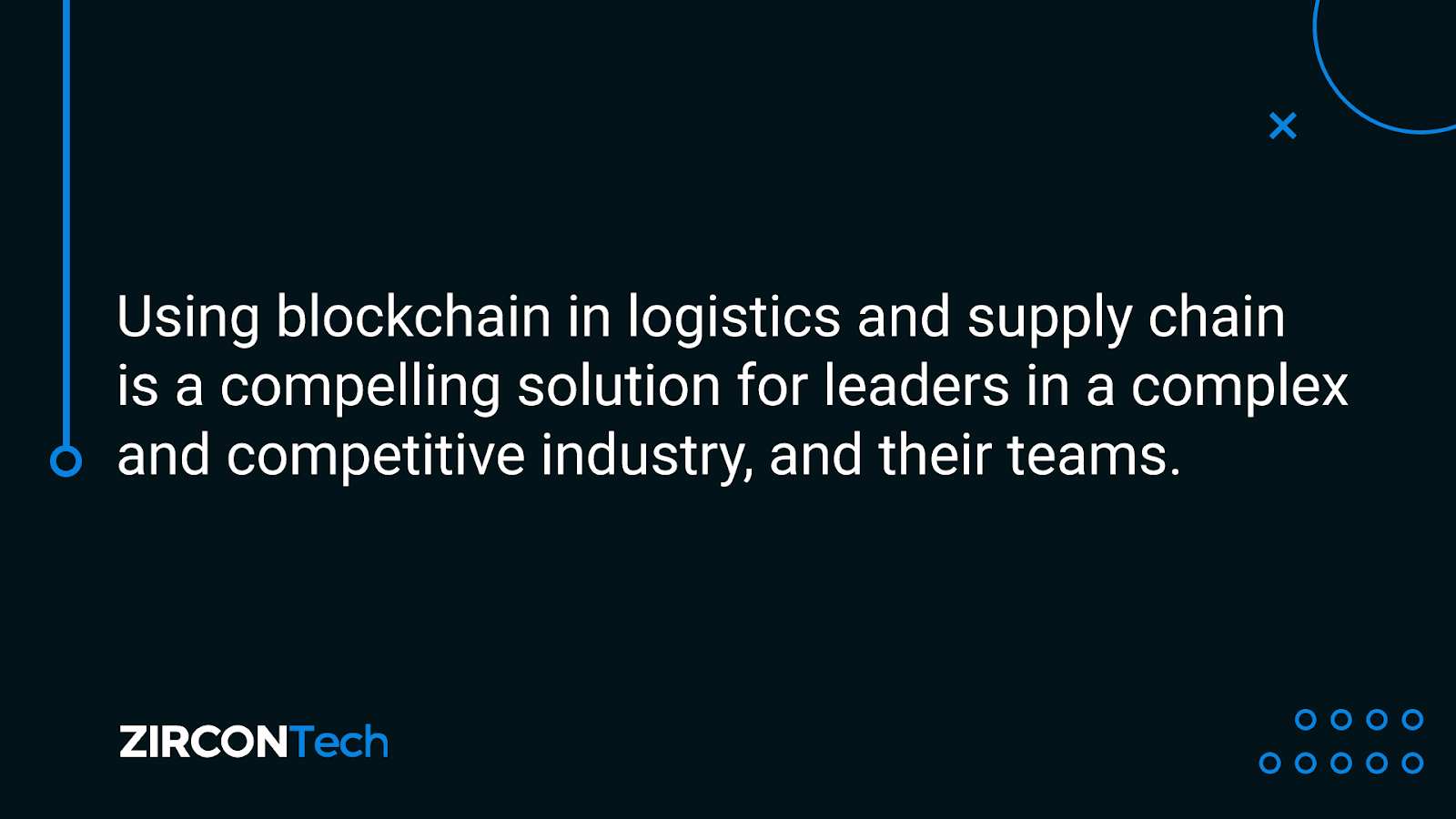
In this guide, we will take a detailed look at blockchain in logistics and supply chain and explain how it can make a huge difference in terms of streamlining the process, and increasing the reliability and trustworthiness of transactions.
We will answer the question, how is blockchain used in logistics? We will also look at some blockchain in logistics examples that illustrate compellingly how this particularly compelling strand of digital innovation can make a difference to your systems and processes.
ZirconTech is a pioneer in the development and acceptance of blockchain technology. We help partners around the world to adopt cutting-edge solutions in digital innovation.
Many organizations in the world of logistics, supply chain and shipping rely on our consultancy services in this field. Allow us to share some of our expertise as we examine the concept of blockchain in logistics.
Blockchain in logistics
Let’s start by defining what we mean by blockchain technology.
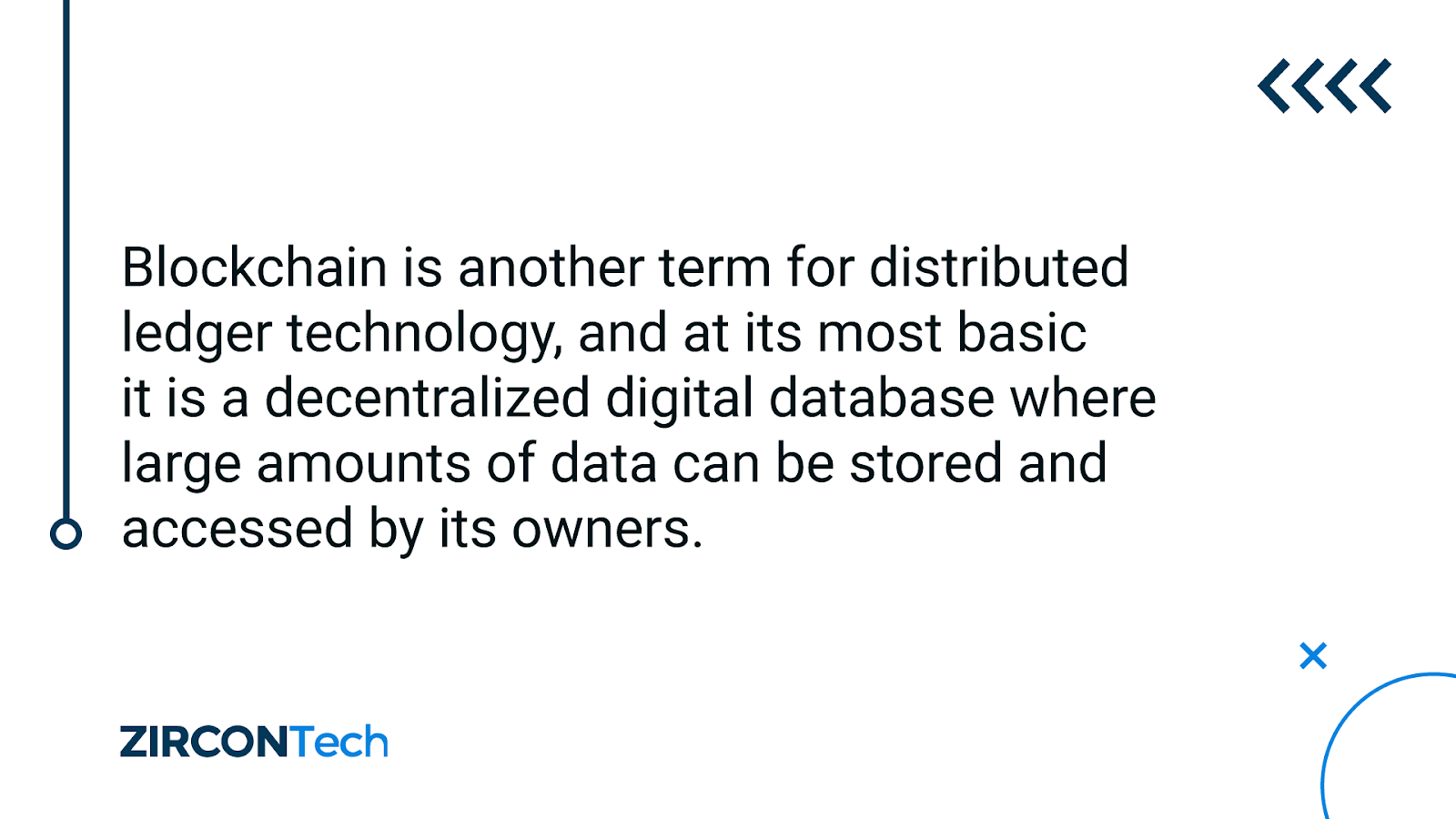
A blockchain is effectively a peer-to-peer network of a number of servers, all of which have access to the activities of the blockchain. If one of the people or companies in the chain adds a piece of data – such as a transaction or an order – all members of the network can see it and approve it.
This verification element is key, because it ensures both transparency and accuracy. You can see immediately why these characteristics are attractive to individuals and organizations working in a service with many moving parts, such as supply chain – and why using blockchain in logistics and supply chain is becoming an increasingly popular option.
Indeed, it is estimated that by 2023, the global market in blockchain in logistics and supply chain will be worth $3.3billion.
How blockchain in logistics and supply chain works
Data in a blockchain is stored in batches known as blocks. Any computer linked to the network can add data, and once a block is full it is added to others in time order – which gives us the label “blockchain”.
Nobody can change the data within any block without it impacting on the others in the chain. This is the attribute that makes the use of blockchain technology a secure option for logistics and supply chain operations.
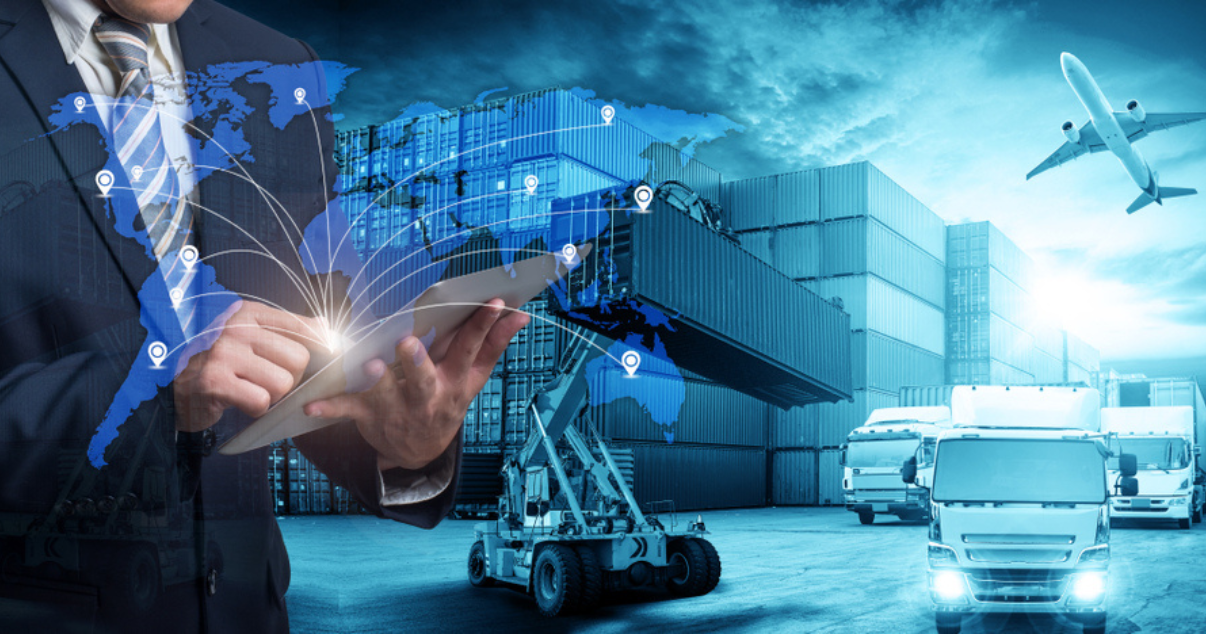
The collective nature of a blockchain is what gives it strength. Because every member of a network can see the history of any changes made, it is almost impossible to access and remove commercially sensitive data. That leads us to the main advantages of blockchain in logistics and supply chain:
- Data security: The digital ledgers that make up a blockchain are decentralized and available to every computer linked to the network. That represents a solid defense against technical issues, even potential widespread failures.
- Flexibility: Any type of data that needs to be kept both accessible and secure can be stored in a blockchain. This versatility makes blockchain technology appropriate to a variety of commercial settings.
- Accuracy: Whenever you add a piece of data to a block, it has to be approved and verified by all computers linked to the network, which represents a strong layer of defense against human error.
- Trackability: Every data entry on a blockchain is time-stamped, which means any person or organization linked to the network can look back over changes made. That makes blockchain technology ideal for complex activities such as logistics, as well as auditing purposes.
How is blockchain changing the logistics industry?
The related industries of logistics, shipping, and supply chain have been no strangers to innovation in recent decades. The advent of third-party logistics (3PL) and widespread digitalization both wrought significant changes to processes within these sectors.
The work of logistic hubs has expanded as a result. Rather than being a bilateral transaction between deliverer and receiver, multiple stakeholders can now be coordinated – they include containers, fuel, finance, transport, and regulation.
At the same time as the logistical process is creating larger and increasingly complex streams of data, the pressure to reduce costs is growing. And this in an era when logistics and supply chain have been impacted by global upheaval caused by geo-political instability and unprecedented events such as the Covid-19 pandemic.
Against such a background, the adoption of blockchain in logistics and supply chain represents a compelling solution. The World Economic Forum has predicted that the widespread adoption of blockchain technology could boost global trade by up to $1trillion over the next decade by accelerating processes and rendering trade barriers less obstructive.
So how, in practical terms, does blockchain technology improve the way we conduct logistical operations?
Increased freight efficiency
Many elements of logistics, supply chain and shipping are incredibly fragmented, which can lead to glaring inefficiencies. In the trucking industry in the USA, for instance, it has been estimated that drivers are covering more than 29 billion miles with their trucks empty or only partially full.
Adopting blockchain technology gives the parties to this process (3PLs, truckers and carriers) a platform that is both secure and transparent, allowing the sharing of information to massively upgrade the planning of future volumes.
Reduced admin costs
This could be the most significant benefit of the widespread adoption of blockchain in logistics and supply chain. Anything that takes a flame-thrower to the mountain of paperwork that accompanies the management of logistics processes surely has to be a good thing.
The nature of blockchain technology means that all parties have access to the information relating to a supply chain or shipping process with far greater security, transparency, and reliability. Some major retailers – including Amazon and Alibaba – have led the way by testing blockchain technology’s ability to make their logistics more efficient.

Tracking in real time
Maintaining visibility of goods as they move through the supply chain has always represented a huge challenge to operators involved in the process. Blockchain technology, however, means the progress of materials can be updated in real time.
In an era when consumers expect ever more efficient deliveries, including next-day and same-day services, the potential of blockchain in logistics and supply chain to grease the wheels and administer a swift and efficient system represents a promise of huge value and worth.
Blockers to widespread adoption of blockchain in logistics
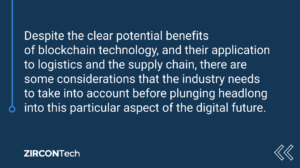
One is that the pace of innovation in logistics and supply chain over recent years has led to the development of a versatile and adaptable industry that already transfers data at virtually real-time speed. The adoption of blockchain technology in many contexts would make little discernible difference to the operation of the supply chain involved.
It is also questionable how practical it is for every single piece of data to be lodged in a block. Some supply chains already generate millions of real-time data updates to the organizations within it.
Blockchain in logistics examples
There are already many instances of companies – some of them multinational household names – that have begun investigating the potential benefits of using blockchain in logistics and supply chain, or blockchain in shipping logistics. They include:
- IBM: The American technology giant, which is now more than 100 years old, has recently created the IBM Blockchain. This initiative uses distributed ledgers to create smart contracts and develop data records. Some huge corporations – including Unilever, Nestle, and Walmart – have developed successful partnerships with IBM using the platform.
- Maersk: This is the biggest operator of shipping containers in the world, and it has begun to embrace the potential of blockchain in shipping logistics. It has used blockchain technology to track the movement of cargo across international borders, and is another example of a major corporation that has partnered with IBM to develop secure logistics processes.
- Microsoft: The technology giant has developed a cloud platform Azure, which employs blockchain technology. Partners that use Azure are able to track items at every step through the supply chain in industries including food distribution and pharmaceuticals. Financial institutions have also taken advantage of the possibilities delivered by Azure.
- Oracle: From its base in Texas, the computer technology corporation has rolled out a SaaS solution called Intelligent Track and Trace. This system enables companies to record and store data from a variety of sources, which in turn means they can track shipments at every step of the process. Businesses who use it report swifter operations and reduced costs.
- Everledger: Transparency is the key benefit delivered by the blockchain technology developed by this organization, with a specific application to the diamond industry. It uses the tech to track each diamond traded, which has improved the industry’s ability to crack down on fraudulent claims, with a resulting rise in trust and credibility.
- Chronicled: A business that is working to improve traceability by the application of blockchain in shipping logistics. It uses blockchain technology and AI to approve instantly financial transactions in the shipping industry. Its IoT devices give logistics firms better insight into their processes, resulting in a more efficient transfer and delivery of products.
- Guardtime: This California organization has developed a blockchain in shipping logistics that has cut down on inefficiencies and, in the process, built trust and transparency. The ledger it has created uses smart contracts to verify data and keep it secure.
- SyncFab: Another California business, but this one works to improve the manufacturing supply chain. Companies who use its platform can access product manufacturing quotes, secure deals with producers and shippers via smart contracts, and track the process by which products are created. It counts Amazon and Google among its clients.
- Modum: From its base in Zurich, Switzerland, Modum delivers products driven by blockchain technology that benefit the pharmaceutical industry. Its services include tracking capability, temperature monitors and smart contracts, all of which work together to enable the on-time delivery of medicines.
- Provenance: Blockchain technology is at the heart of this London-based provider with a focus on the retail industry. Retailers can give their customers more peace of mind by tracking the development of their products, and showcasing their supply chains, to create more trustworthy goods and services.
Conclusion: How can ZirconTech help you?
It is clear from the examples of the ways in which blockchain in logistics is being used by many organizations that this is a concept of today, as well as tomorrow. Blockchain technology is here now in logistics and supply chain – and its benefits are being enjoyed already by a host of companies and industries around the world.
ZirconTech has extensive experience in the creation of solutions on public and private blockchains. Our expertise in blockchain technology means that we regularly provide consultancy services to business leaders in the logistics industry who are ready to incorporate the potential of blockchain in logistics and supply chain into their digital transformation.
When you want to begin a conversation about blockchain in logistics with an expert partner, it is time to talk to ZirconTech.